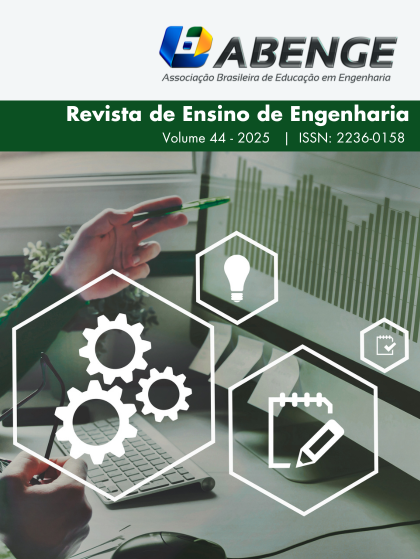STEAM CAREERS FOR GIRLS: METHODOLOGY PROPOSAL FOR ELEMENTARY SCHOOLS
Palavras-chave:
mulheres na ciência, desigualdade de gênero, cartilha infantil, equidade em carreiras profissionais, igualdade de gêneroResumo
Gender disparities in STEAM careers remain a global challenge, often reinforced by the lack of female role models in early education. Encouraging girls from a young age to explore these fields is essential to building a more inclusive and diverse professional future. This article presents a methodology designed to introduce elementary school children to STEAM and environmental careers from an egalitarian perspective, using real female professionals as references. The main objective is to promote gender awareness and professional diversity through playful and interdisciplinary activities. The methodology resulted in the development of a multilingual booklet featuring six professions related to civil construction and sustainability, supported by pedagogical theories from Piaget, Montessori, and Freire. Activities were tested with 49 students aged 9 to 10 in a public school in Santa Maria, Brazil. Results indicate high engagement, curiosity, and critical reflection among children, especially in recognizing women's contributions in traditionally male-dominated fields. The findings suggest that gender-inclusive educational strategies aligned with SDGs 4 and 5 can foster interest in STEAM careers and help reshape perceptions of gender roles from an early age.
-
As disparidades de gênero nas carreiras STEAM continuam sendo um desafio global, muitas vezes reforçado pela ausência de modelos femininos na educação básica. Estimular meninas desde cedo a explorar essas áreas é essencial para construir um futuro profissional mais inclusivo e diverso. Este artigo apresenta uma metodologia para introduzir crianças do Ensino Fundamental às carreiras STEAM e ambientais com uma perspectiva igualitária, utilizando profissionais mulheres reais como referência. O principal objetivo é promover a conscientização de gênero e a diversidade profissional por meio de atividades lúdicas e interdisciplinares. A metodologia resultou na criação de uma cartilha multilíngue com seis profissões relacionadas à construção civil e à sustentabilidade, fundamentada em teorias pedagógicas de Piaget, Montessori e Freire. As atividades foram aplicadas com 49 estudantes de nove a dez anos em uma escola pública de Santa Maria, Brasil. Os resultados indicam alto engajamento, curiosidade e reflexão crítica por parte das crianças, especialmente no reconhecimento das contribuições femininas em áreas historicamente masculinas. As conclusões apontam que estratégias educacionais inclusivas e alinhadas aos ODS 4 e 5 podem despertar o interesse pelas carreiras STEAM e ajudar a transformar percepções sobre papéis de gênero desde a infância.
Referências
CARNICELLI, S.; BOLUK, K. The promotion of social justice: Service learning for transformative education. Journal of Hospitality, Leisure, Sport & Tourism Education, [S.L.], v. 21, p. 126-134, nov. 2017.
CFF. Energia solar no Brasil: quais são as barreiras e oportunidades para as profissionais mulheres no setor. C40 Cities Finance Facility. Brasília, 2021.
DEL-BURGO, J. F. et al. Exploratory study on didactic aspects used in scientific-technical (STEM) dissemination conferences for students of secondary education. Journal of Technology and Science Education, [S.L.], v. 12, n. 1, p. 86, 10 fev. 2022.
FUESTING, M.; DIEKMAN, A. B.; HUDIBURGH, L. From classroom to career: the unique role of communal processes in predicting interest in STEM careers. Social Psychology of Education, [S.L.], v. 20, n. 4, p. 875-896, 8 set. 2017.
GWNET. GLOBAL WOMEN’S NETWORK FOR THE ENERGY TRANSITION. Women for Sustainable Energy: Strategies to Foster Women’s Talent for Transformational Change, 2019. In Portuguese. Available at: https://www.globalwomennet.org/ women-for-sustainable-energy/. Accessed 14 sep. 2024.
JACKSON, M. C. et al. Talking about science interests: the importance of social recognition when students talk about their interests in STEM. Social Psychology of Education, 22(1), 149–167, 2019. [S.L.], v. 22, n. 1, p. 149-167, 31 out. 2018. Springer Science and Business Media LLC.
KANG, H. et al. How do middle school girls of color develop STEM identities? Middle school girls’ participation in science activities and identification with STEM careers. Science Education, [S.L.], v. 103, n. 2, p. 418-439, 31 dez. 2018.
KAREN, D. No Child Left Behind? Sociology Ignored! Sociology of Education, [S.L], v. 78, n. 2, p. 165-169, 2005.
LILLARD, A. S.; ELSE‐QUEST, N. M. Evaluating Montessori Education. Science, [S.L.], v. 313, n. 5795, p. 1893-1894. 2006.
MAY, G.; CHUBIN, D. E. A retrospective on undergraduate engineering success for underrepresented Minority students. Journal Of Engineering Education, [S.L.], v. 92, n. 1, p. 27-39, 2003.
MUNARI, A. Jean Piaget. Org.: Daniele Saheb. Recife: Fundação Joaquim Nabuco, Editora Massangana, 2010.
MUSEUS, S. D. Special issue: Racial and Ethnic Minority Students’ Success in STEM Education. (n.d.). https://eric.ed.gov/?id=EJ919997.
OAKES, J. Lost talent: the underrepresentation of women, minorities, and disabled persons in science. Santa Monica (CA): Rand Publishers, 1990.
OECD/ECLAC/CAF. Latin American Economic Outlook 2017: Youth, Skills and Entrepreneurship, OECD Publishing. Paris, 2016.
OGEGBO, A.A.; AINA, A.Y. Exploring young students’ attitude towards coding and its relationship with STEM career interest. Education And Information Technologies, [S.L.], p. 365-1314, 2023. Springer Science and Business Media LLC. http://dx.doi.org/10.1007/s10639-023-12133-5.
PAN, A. C. et al. A realidade das mulheres no setor da energia solar. Revista 3 S - Solar, Sustainable Solutions, 1ª edição - Vol.1, p. 35-39, 2020.
PAPADAKIS, S., KALOGIANNAKIS, M., GÖZÜM, A.I.C. Editorial: stem, steam, computational thinking, and coding. Frontiers In Psychology, [S.L.], v. 13, 2022. Frontiers Media SA.
PIAGET, J. The Equilibration of Cognitive Structures: The Central Problem of Intellectual Development. Chicago and London: University of Chicago Press, 1985.
SCHÖN, D. A. Educating the reflective practitioner: Toward a new design for teaching and learning in the professions. Jossey-Bass, 1987.
SHEVTSHENKO, E. et al. Dissemination of Engineering Education at Schools and its Adjustment to Needs of Enterprises. Daaam Proceedings, [S.L.], p. 0044-0053, 2017. DAAAM International Vienna.
UFSM. Federal University of Santa Maria. SAI - International support bureau. 2023. Available at: https://www.ufsm.br/orgaos-de-apoio/sai. Accessed 14 sep. 2024.


